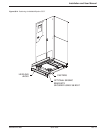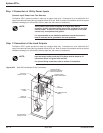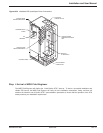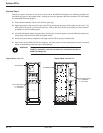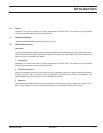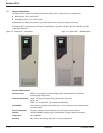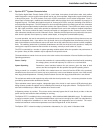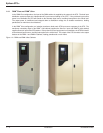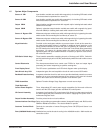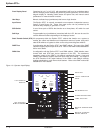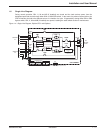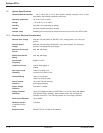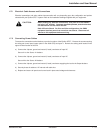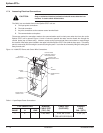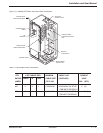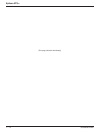
Installation and User Manual
1.5 System Major Components
Source #1 CB1 Input isolation molded case switch with magnetic trip for
isolating SCR static switch
#1 and associated components from source S1.
Source #2 CB2 Input isolation molded case switch with magnetic trip for
isolating SCR static switch
#2 and associated components from source S2.
Output CB3A Output isolation molded case switch with magnetic trip for isolating both static switch
sections from the load.
Output CB3B Optional, redundant output isolation molded case switch with magnetic trip (paral-
leled with CB3A) for isolating both static switch sections from the load.
Source #1 Bypass CB4 Maintenance bypass molded case switch with magnetic trip for bypassing the static
switch section and connecting the load directly to source S1.
Source #2 Bypass CB5 Maintenance bypass molded case switch with magnetic trip for bypassing the static
switch section and connecting the load directly to source S2.
Keyed Interlocks Provided on the two bypass switches to prevent closure of both at the same time.
An optional interlocking scheme is available for additional keyed interlocks on the
source isolation switches to ensure that, prior to bypassing to a particular source,
the STS transfers the load to that source if the load is not already being powered by
that source. On closure of a bypass switch, the control logic will also shunt trip
opposite bypass and input isolation switches if necessary to prevent cross-connec-
tion of the two sources.
SCR Static Switch Assy. Three heatsink assemblies containing six pairs of “hockey-puck” SCR's. Switch #1
and #2 (each having 3 pairs of SCR's) automatically switch the load to either source
S1 or S2.
Control Electronics The microprocessor-based core control uses FPGA’s for input and output signal
processing and control sequencing to optimize sensing time.
Front Display Panel The LCD screen, pushbuttons and LED mimic diagram make up the display.
Gate Drive & Acq. PCA Independent gate drive and acquisition circuits for each sources SCR switch.
Backfeed Protection Assy A separate redundant circuit for each source provides backfeed protection to ensure
that there is no cross-connection between the two sources in the event of a shorted
SCR on the inactive source with the upstream circuit breaker open.
TVSS Assemblies Optional Transient Voltage Surge Suppressor on each source input.
Triple-Redundant
Control Power Supplies Three, independent DC control power supply assemblies (fed from each of the two
sources and the STS output) provide redundant DC control power.
CB Control Assembly A separate circuit supplies DC control power (fed directly from the output terminals)
for shunt-tripping the power switches CB1-5 and for supplying EPO power even in
maintenance bypass mode.
Output Snubber Assembly Provides preload under no-load conditions.
Communications Card Cage Relay card providing programmable contacts (6 outputs/2 inputs) and JBUS card for
RS232 or RS485 connections. Two slots available for options.
Customer Terminal Block Terminals for connection of remote Emergency Power Off (EPO) and Source Loss
Test switch.
Fans (400/600A Models only) Ventilation fans provide forced-air cooling
in the 400/600A models. 200A models are
convection cooled.
Introduction 1 — 586-504004-00 B03



